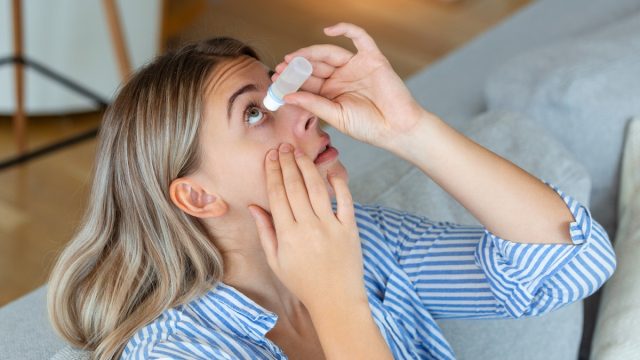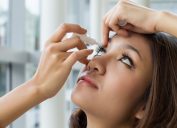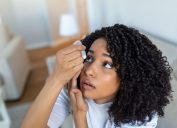FDA Releases New List of Warnings About OTC Eye Drops Amid Mass Recalls
Over 25 eye drops have been removed from shelves due to contamination and risk of infection.

As we venture further into winter and chillier weather, our dry, itchy eyes make their long-dreaded return. Luckily, for most of us, that's nothing over-the-counter eye drops can't fix. These products work like magic to restore moisture and alleviate itching and redness. Prescription eye drops can also be used to combat eye infections, as well as conditions like glaucoma. However, the U.S. Food and Drug Administration (FDA) is urging users to proceed with caution this winter after discovering several potential "heightened risks" linked to OTC eye drops, amid a massive safety recall.
RELATED: OTC Pain and Fever Meds Recalled Over "Health Risk," FDA Warns.
It goes without saying that in order for eye drops to work, they must be sterile. That's especially important because "drugs applied to the eyes bypass some of the body's natural defenses," the FDA explained in a Dec. 12 release.
Since August, nearly 30 OTC eye drop products—from brands like Leader, Rugby, and Velocity— have been recalled due to contamination that carries the risk of infection. The products in question were flagged for numerous health and safety concerns, including serious consequences like "partial loss of vision and blindness," according to the FDA.
Store brands sold at CVS, Rite Aid, and Target were also listed on the recall list, though the FDA reported that those retailers were pulling the affected products from shelves and websites. Products from Leader, Rugby, and Velocity may still be available, and the FDA is advising shoppers to steer clear of the recalled eye drops for the time being.
RELATED: Diet Coke and Sprite Cases Recalled for Possible Contamination, FDA Warns.
If you do need to use OTC eye drops this winter, the FDA's latest release has a list of warnings and red flags you need to know.
First, you should avoid OTC products that are advertised for serious eye conditions (glaucoma, cataracts, retinopathy, or macular degeneration). You should also steer clear of eye drops labeled "homeopathic," or that contain the ingredients silver sulfate, argentum, or methylsulfonylmethane (MSM).
Before you apply the drops, be sure to thoroughly wash your hands, the FDA also cautions. The spout that releases the drops shouldn't come in physical contact with anything, including your hands and eyes.
And pay close attention to how your body responds to any eye drops that you're using. If you start to notice abnormal side effects, like pain and discomfort or eye discharge, stop use immediately and contact a healthcare professional.
Lastly, but most importantly, the FDA reminds you to double check that you aren't purchasing OTC eye drops from the recall list.
RELATED: For more up-to-date information, sign up for our daily newsletter.
Best Life offers the most up-to-date information from top experts, new research, and health agencies, but our content is not meant to be a substitute for professional guidance. When it comes to the medication you're taking or any other health questions you have, always consult your healthcare provider directly.




















